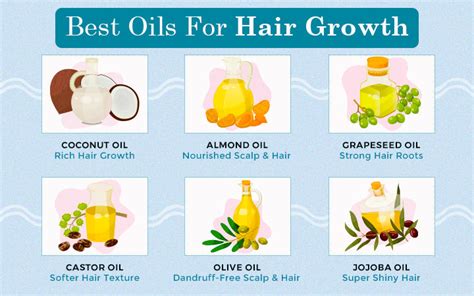Hair is an essential part of our identity and appearance. Healthy hair reflects not only our physical well-being but also our self-confidence. However, factors like stress, pollution, and genetics can affect hair growth and thickness, leaving us frustrated and seeking solutions. Among the various hair care products available, hair oils have emerged as a natural and effective way to promote hair growth and thickness. This comprehensive guide will delve into the world of hair oils, exploring their benefits and identifying the best options for achieving your hair goals.

Hair oils have been used for centuries to nourish and protect hair. They offer numerous benefits, including:
- Improved growth: Hair oils contain essential nutrients that penetrate the hair shaft, stimulating hair follicles and promoting growth.
- Increased thickness: Oils provide hydration and nourishment, making hair strands thicker and fuller.
- Reduced breakage: Hair oils act as a protective barrier, shielding hair from environmental damage and reducing breakage.
- Glossy appearance: Oils add shine and luster to hair, giving it a healthy and vibrant appearance.
Numerous hair oils are available, each with unique properties and benefits. Here are some of the most popular options:
- Argan Oil: Rich in antioxidants and vitamins, argan oil nourishes hair, promotes growth, and reduces frizz.
- Coconut Oil: A natural moisturizer, coconut oil penetrates hair shafts, providing deep hydration and protecting hair from breakage.
- Castor Oil: Rich in ricinoleic acid, castor oil stimulates hair growth, thickens hair strands, and reduces shedding.
- Jojoba Oil: Closely resembling the natural oils produced by the scalp, jojoba oil balances oil production, strengthens hair, and promotes growth.
- Olive Oil: A rich source of vitamins and antioxidants, olive oil nourishes hair, prevents dryness, and adds shine.
Selecting the right hair oil depends on your hair type and specific needs. Here are some factors to consider:
- Hair Type: Oils suitable for dry hair include argan, coconut, and castor oil. For oily hair, lighter oils like jojoba or tea tree oil are preferred.
- Hair Concerns: If you struggle with hair loss or thinning, look for oils that promote growth, such as castor or rosemary oil. For dry and damaged hair, oils like argan or coconut oil offer excellent nourishment and protection.
- Personal Preferences: Consider your fragrance preferences and the texture of the oil. Some oils, like castor oil, are thicker and may need to be thinned before use.
To maximize the benefits of hair oils, follow these steps:
- Warm the oil: Slightly warm the oil in your hands or a microwave to make it more easily absorbed.
- Apply to the scalp: Part your hair and apply the oil directly to the scalp using your fingertips. Massage gently to promote circulation.
- Distribute through hair: Spread the remaining oil from the scalp to the ends of your hair, focusing on the drier areas.
- Leave in: Cover your hair with a shower cap or towel and leave the oil in for at least 30 minutes or overnight.
- Wash and style: Rinse your hair with warm water and shampoo. Style as usual.
Based on research and customer reviews, here are some highly recommended hair oils:
- Best Overall: Argan oil
- Best for Thinning Hair: Castor oil
- Best for Dry Hair: Coconut oil
- Best for Damaged Hair: Olive oil
- Best for Oily Hair: Jojoba oil
Hair oils offer a natural and effective solution for hair growth and thickness. By understanding the benefits, types, and uses of hair oils, you can choose the best option for your hair type and concerns. With regular use, hair oils can transform your hair, making it stronger, thicker, and more beautiful. Embrace the power of nature and unlock the full potential of your hair.
1. How often should I use hair oil?
Frequency depends on hair type and needs. For dry hair, use hair oil 2-3 times a week. For oily hair, use it less frequently, such as once a week or as needed.
2. Can I leave hair oil in overnight?
Yes, leaving hair oil in overnight allows for maximum absorption and nourishment.
3. Is it safe to use hair oil on colored hair?
Yes, it is generally safe to use hair oil on colored hair. However, avoid oils that may darken or alter hair color, such as henna oil.
4. Can hair oil cause hair loss?
No, hair oil does not cause hair loss. In fact, it can strengthen hair and reduce breakage.
5. What are the benefits of castor oil for hair?
Castor oil is rich in ricinoleic acid, which promotes hair growth, thickens hair strands, and reduces inflammation.
6. How can I prevent buildup from hair oil?
To prevent buildup, use clarifying shampoos or apple cider vinegar rinses occasionally. Additionally, avoid applying excessive amounts of oil.
7. Can I mix different hair oils?
Yes, you can mix different hair oils to create a custom blend that meets your specific hair needs.
8. What is the difference between essential oils and hair oils?
Essential oils are concentrated plant extracts, while hair oils are natural oils derived from plants or seeds. Essential oils should be diluted before applying them to the hair.
